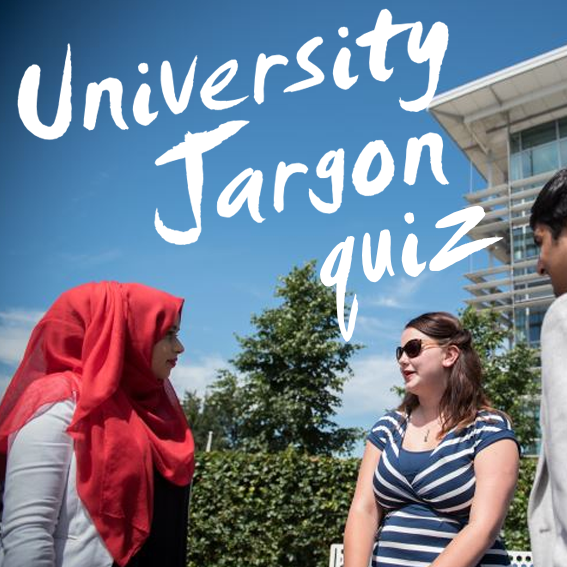University jargon A-Z
B
Bachelors degree
A Bachelors degree is not the only qualification you can take at university, but it is what most people mean when they say they are studying for a degree. It is awarded after completing a three, or sometimes four year programme of study. You can find out more about undergraduate degrees here.
BA
A BA is a type of Bachelors Degree, it stands for Batchelor of Art. Though it is often awarded to students studying art it can also be used for a whole range of degrees that don’t fit into the BSc or BEng categories, like the humanities or media.
BEng
BEng stands for Bachelor of Engineering, it is a Bachelors Degree that is awarded to students who have studied engineering based subjects.
BSc
BSc stands for Bachelor of Science. It is awarded to students who study in scientific fields, but like the BA it can cover subjects that might not be thought of as traditional sciences. For instance, some of the Business courses taught at Middlesex are BSc.
C
Campus
Most universities take up a number of buildings. These buildings are often located in the same area or grounds, and this is called a campus. Campuses are not just about the buildings where people learn, they also usually include places to eat, socialise and sports facilities.
Clubs & societies
Clubs and societies are where people with similar interests can get together and have fun. They are an important part of socialising at university, and you’ll find societies for people with all sorts of interests on most campuses. You can read about Ludovica's experience as president of the Journalism society at Middlesex here.
D
Distance Learning
By attending web based classes, doing their work and research online and in local facilities some students study without being a university or college campus. This means they can study from home, or whilst working. Distance learners often complete their studies part time, and not having to be on campus can make it much easier to fit studying around a job or other activities. Sometimes distance learners will have to head to campus occasionally, often to meet the academics they have been working with face-to-face, or for exams.
E
Entry requirements
These are the grades or qualifications that you’ll need to have to get onto a particular course. Entry requirements are different for every course and university, so it is worth finding out as early as you can what the requirements are for courses you are interested in. Some universities use UCAS Tariff Points whilst others will tell you what grades and subjects you are expected to get.
F
Foundation year
Foundation years are designed to prepare students for study on a bachelors programme. They are usually taken by students who do not quite meet the entry requirements for their course, but who still have the potential to do well at university.
G
Gap year
People often take a year out of education before they start university. It is a great opportunity to travel, get work experience and prepare for life at university. Learn more about gap years here.
H
Halls of residence
Halls of Residence is another name for student accommodation. It is often managed by the university, and whilst not all halls of residence are the same, they often offer students a private room with a shared living area and kitchen. Some halls of residence also offer private bathrooms. The nice thing about halls of residence is that because they are specifically for students everything is included, meaning no bills to worry about. Students share their living experiences at university on our Home or Halls page.
L
Lecture
A lecture is a type of class where an academic presents to a group of students. Students attending lectures are expected to pay attention and make notes that they will use to discuss what was said in the lecture later. This usually takes place in a seminar.
R
Reading list
At the start of a course at university students will be given a reading list. This is a list of books or papers that will be helpful for them to read. It is not every book they will have to read, but a starting point for their reading and a guide to what will be helpful as they work through the course.
S
Seminar
A seminar is far less formal than a lecture, it is where students get together in smaller groups, often guided by an academic, but not always, to discuss what they are learning. It is a chance to share ideas and try things out.
Student ambassador
A student ambassador is a current or former student who is paid by the university to help out at events and activities. They get some great work experience whilst in a huge range of roles, from showing around new students, to helping out with conferences or activities for visiting schools.
Student finance
Student finance refers to two loans that are available to students to help pay for their university study. Read our What is: student finance guide for more information.
Student services
Student Services is the name for all of the support services at a university. Student services can help with a huge range of things, from assistance with finding accommodation, to support with mental health whilst you learn. Whilst most students won’t come across all of the services they provide during their time at uni, they are always there to help.
Student Union
Student Unions are run by students, for students. They represent the students studying at the university, making sure things like equality and diversity are addressed. The students union are also about having fun, they organise social events for students, and help to run clubs and societies.
U
Undergraduate
An undergraduate is a student who has not yet earned their Bachelors Degree. When students have completed their bachelors degree they become graduate students.
UCAS
UCAS is the university applications service. UK based students send their university application to UCAS, and they send it on to the university. Applicants can then use the UCAS website to check the progress of their application. UCAS also provide lots of advice around finding courses and the application process.
UCAS tariff points
UCAS tariff points are sometimes used in university entry requirements. The tariff points are used to convert the grades students get in a wide range of qualifications (like A-Levels or BTECs) into a single number.
V
Vocational
Vocational courses are usually about helping you to learn by giving you as much hands on experience in a particular area as possible. This does not mean they are all about practical work though, they are all about preparing you for a career in a specific area. Generally, when you have completed a vocational course you should be ready to work in the role that the course was designed to prepare you for.




